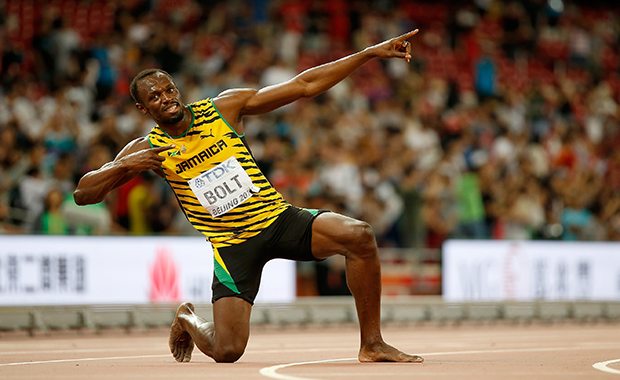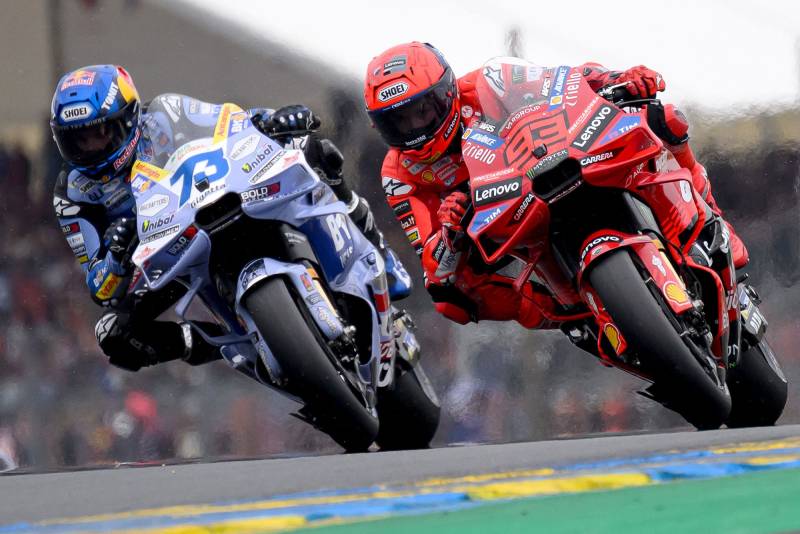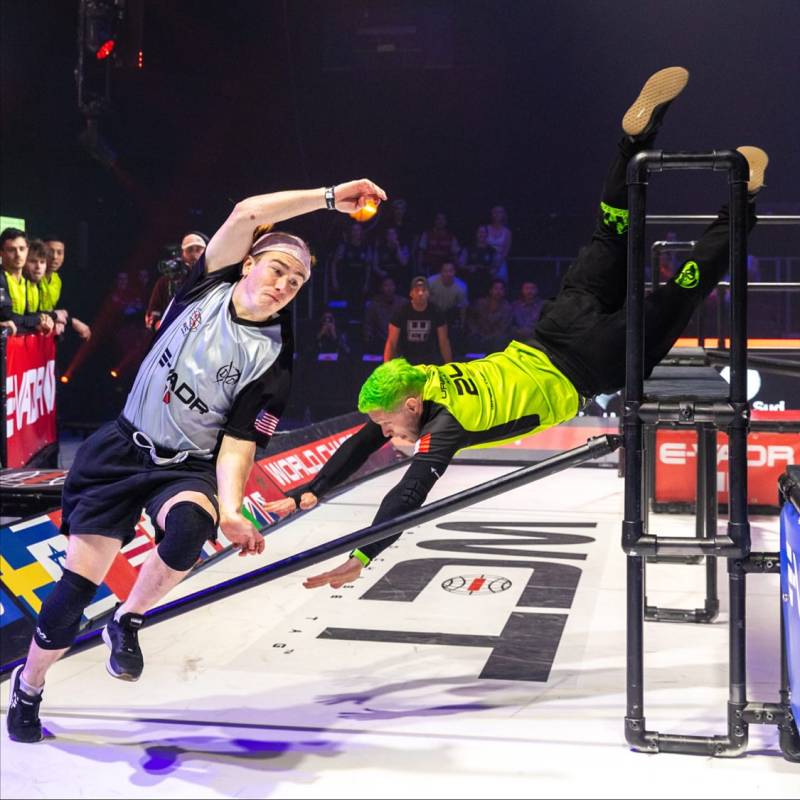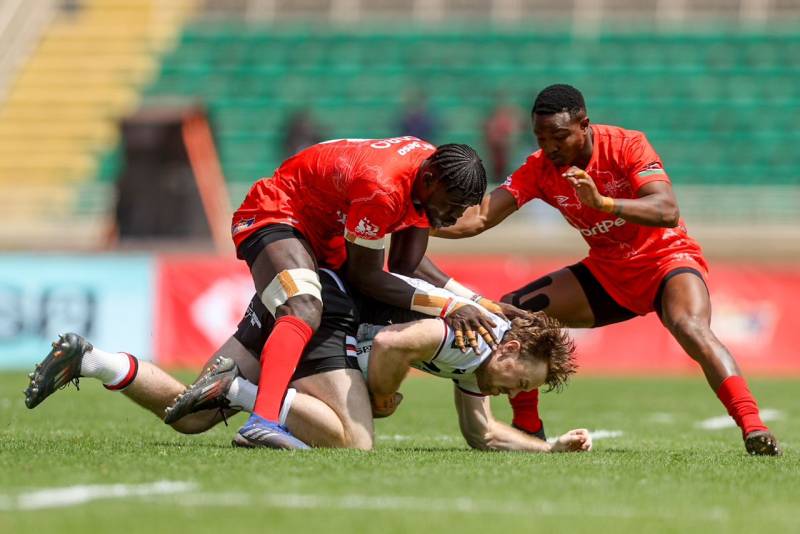Hang on,” I can’t help thinking as I wait for Usain Bolt – the Usain Bolt, Fastest Man In The World Usain Bolt – to magically appear on the laptop screen in my kitchen. Bolt has released a reggae album with his childhood friend and manager Nugent “NJ” Walker, and I’ve been granted an interview. Except… has there been some terrible mix-up? Am I interviewing some other Usain Bolt, some lesser-known reggae artist who just happens to share his name? Why on earth would a man widely considered to be the greatest sprinter of all time, a three-time world record holder, be releasing a reggae record?
But, nope, there he is, beaming at me from a nondescript kitchen somewhere in the world. (He’s actually in the UK, ready to play for the World XI against an England XI at Soccer Aid at Manchester City’s Etihad Stadium; days later, a clip will circulate of the long-retired Liverpool and England footballer Jamie Carragher beating him in a foot-race for a through ball.) He’s got the Bolt brand logo – a black bolt of lightning inside a yellow B – on the left breast of his black T-Shirt. There’s no mistaking it.
So why has he decided to put an album out?
“I’ve been talking about making an album for the past three years,” he says, leaning forward in his chair, “then the pandemic started and I had a whole lot of time on my hands.”
Didn’t we all?
“Everyone knows me as a track athlete,” he goes on, as various people pop in and out of shot behind him. “And I wanted to show people that I can do music, too.”
I wanted to show people that I can do music, too
Usain Bolt could have been many things, though of course he’s right: we know him best as the long-limbed, charismatic, always-smiling, world-beating runner. The world record of 9.58 seconds he set in the 100m final at the 2009 World Championships in Berlin, remains unbeaten, meaning he is still officially the fastest man in the world. He still holds world records in the 200m (19.19 seconds) and as part of the Jamaican 4 x 100m relay team that won gold at the Rio Olympics in 2016 (36.84 seconds). He retired in 2017, after tearing his hamstring during the 4 x 100m relay final at the 2017 IAAF World Championships. (The muscle went with just 50m to go and he had to be helped over the finishing line by his three teammates.)
Between 2008 and then he won 134 of 146 races, including 11 World Championship gold medals, eight Olympic golds and, you’d have thought, plenty of money. After he retired, he embarked on a surprising second career as a professional footballer, trialling for the Norwegian club Strømsgodset and then for the Australian team Central Coast Mariners. (Neither club offered him a professional contract, which put paid to his hopes of one day playing for Manchester United, a childhood dream.) He once considered a move to America, to join the National Football League.
Most people reacted to Bolt’s second-career sporting attempts with surprise, mild and not-so-mild. Some pundits likened his decisions to similar ones made by Michael Jordan, who gave up basketball at his peak to play baseball, a sport he loved and became passable but not great at. People will respond to Bolt’s musical career in the same way. Why is a sporting legend, whose name is literally written into the history books, trying to be a record producer? Why dilute a legacy?
The young Bolt actually had another ambition while growing up: to be a spy. “I was brought up in Sherwood Content, a small country town in northwest Jamaica,” he says. “Like every Jamaican household on a Sunday, we’d have rice, peas and fried chicken… My dad had a farm where he would grow yam, banana and potatoes, so we ate a lot of ground food. Fruit trees were the best things. We could get mangos, apples, guavas and anything you could think of straight off the tree without having to say, ‘Mum, I’m hungry.’” It was here that the young Bolt first honed his sprinting skills. “Sometimes you’d go to a mango orchard that you knew you shouldn’t be in and someone would chase you out. That’s where I got my first taste of running away as fast as I could.”
“We weren’t a massive family – just me, Mum, Dad, younger brother, younger cousin and older sister,” he continues. “Every Sunday we would eat, chill out and watch movies as a family. I loved Bond. The first one I saw was Tomorrow Never Dies” [Pierce Brosnan’s second outing, released in 1997, when Bolt was 12] “with the invisible car. I’d get back to school on the Monday and everybody would be talking about the gadgets… and we’d all want to be spies.”
While Bolt never acquired his 00 status, surprisingly athletics wasn’t the first sport he took to.
“We were always playing football and cricket in the streets,” he says. “Cricket was my life, because that’s all my dad would watch. He was a massive West Indies fan, but I didn’t understand why I was supposed to support them just because I was from the West Indies, so I supported Pakistan. I was a massive fan of Waqar Younis,” the youngest Pakistani Test captain in history. “He was a fast bowler and really good at bowling Yorkers” – balls pitched very close to the batsman. “I was a fast bowler, too. One day, my cricket coach saw me and said: ‘Maybe you should try sprinting on the track as well.’ I did both for a while, but when I got to high school, I started focusing more on track and field because that was where my talent lay.”
I ask if he still interested in cricket. Does he still play? “I still watch 20/20s, but I’m not sure what people would think if they saw me bowling down the wicket at them. I think I could still bowl, but my batting needs a lot more practice.”
Bolt won his first high school medal for the 200m aged 14. By 15, he was the youngest ever World Junior Championships gold medallist, and soon he was travelling all over the world. “And then I got to be the fastest man in the world, which was an amazing thing to be labelled. When people come up to me, no matter who they are, the first thing they always say is: ‘Do you want a race?’ It’s great to feel so appreciated.”
Sport aside, his other great passion has always been music. “Obviously you hear Bob Marley everywhere in Jamaica,” he says. “Growing up, families would get together at what we called ‘round robins’ – family gatherings held outdoors and at community centres – “and listen to old-school Jamaican music like Beres Hammond and Bunny Wailer. I’ve grown up on old-school reggae since I was eight or nine. Then, when I was a teenager, the Anger Management riddim took Jamaica by storm….”
Riddims are beats that are commercially released by a producer, and which different artists then remix and DJ – or rap – on top of. It’s how Shaggy and Sean Paul started, DJing over riddims. The Anger Management riddim came out in 2004, when Bolt was 18, and all the top Jamaican artists of the time – Bounty Killer, Baby Cham, Beenie Man, Sizzla – released their own versions.
“I only started going to clubs when I moved to Kingston at 17,” he continues. “Jamaican people are always dancing, so we make specific music for dance: reggae and dancehall. When it comes on, it’s time to dance.” Before this album, Bolt had been steadily releasing mixtapes. “I want to be one of the best producers in the business, like DJ Khaled or Swizz Beatz or Rvssian. So I’ve produced a reggae/dancehall album with my best friend, Nugent ‘NJ’ Walker.”
We felt the energy. Late last year we felt like we should do an album, put ourselves out there
“Ha, no,” he laughs. “I’m happy to add some drops and appear in the music videos, but I don’t think my voice is that good for singing, so I don’t plan to pick up the microphone unless it’s absolutely necessary. I’m more the guy behind the decks, hyping up the crowd, giving out the vibe…” Unlike with running, he feels less of a need now to be front and centre. But music, he says, was always “something we actually wanted to do. We felt the energy. Late last year we felt like we should do an album, put ourselves out there.”
There are no plans for a live tour yet, but he isn’t ruling it out. “If you follow my career, you can always see me laughing, dancing, doing something. I love putting on a performance. Anything I put my hand and my head to, I want to be the best.”
Country Yutes is currently riding high on the Billboard Reggae Album charts, so it looks like Bolt may have succeeded in the strangest career change of all time: Fastest Man In The World to chart-topping reggae producer. What’s next? “Now I want to win a Grammy.”




